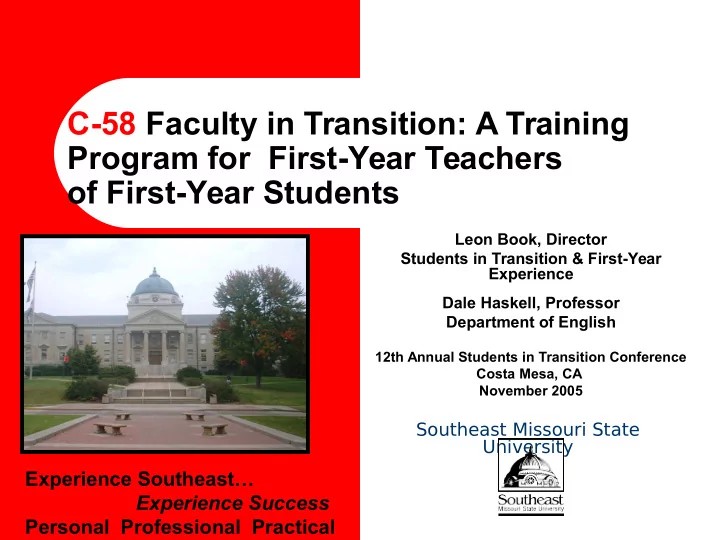

C-58 Faculty in Transition: A Training Program for First-Year Teachers of First-Year Students Leon Book, Director Students in Transition & First-Year Experience Dale Haskell, Professor Department of English 12th Annual Students in Transition Conference Costa Mesa, CA November 2005 Southeast Missouri State University Experience Southeast… Experience Success Personal Professional Practical
Bear with Us…
Southeast Facts… Founded in 1873 Located in Cape Girardeau, MO, a city of ~40K on the Mississippi River between St. Louis and Memphis Comprehensive Regional State University Moderately selective admission criteria Average ACT: 22.5
More Southeast Facts… Record Fall 2005 enrollment: 10,400 Students – 84% from Missouri – 12% from Out-of-state – 3% International students – 1% Unknown origin Students from – 45 U.S. states – 51 foreign nations 7.7% Minority 62% Female
Southeast Missouri State University Service Region
How UI100 “Fits” into General Education Program • UI100 required first-year interdisciplinary 3 hrs. seminar • 1 course in each of 12 categories of 36 hrs. knowledge • 2 interdisciplinary courses at the 300-level 6 hrs. • 1 interdisciplinary course at the 400-level 3 hrs. • Total 48 hrs.
The Nine University Studies Objectives Students will demonstrate … 1. the ability to locate and gather information. 2. capabilities for critical thinking, reasoning and analyzing. 3. effective communication skills. 4. an understanding of human experiences and the ability to relate them to the present. 5. an understanding of various cultures and their interrelationships.
The Nine University Studies Objectives Students will demonstrate … the ability to integrate the breadth and 6. diversity of knowledge and experience. the ability to make informed, intelligent value 7. decisions. the ability to make informed, sensitive 8. aesthetic responses. the ability to function responsibly in one's 9. natural, social and political environment.
Components of UI100 across Sections Theme-based interdisciplinary seminar academic in nature, not “success” class required of 4-yr degree-seeking students w/fewer than 24 hrs. Significant emphasis on Objectives 1, 2, and 3 (information literacy, critical thinking, communication)
Components of UI100 across Sections Theme as vehicle to practice set of objectives and basis of assignments Common/mutual assignments and expectations across sections 1. Bibliographic assignment (e.g., term paper) 2. Oral presentation(s) 3. “Critique and Rebuttal” assignment 4. Critical thinking mini-portfolio 5. Connecting academic planning and career planning: FOCUS career assessment
More about UI100 Fall 2005 69 sections 45 interdisciplinary themes 59 Instructors 15 “Newbies” Sections taught in every building on campus! Sections taught by every department except one! Sections taught via I-TV and on the web
More about UI100: Regional Campuses Regional Campuses Perryville – 30 mi. north Sikeston – 30 mi. south Bootheel (Malden) – 70 mi. south Kennett – 90 mi. south
Complications with UI100 Staff provided by academic deans Little if any control over instructor assignments Diverse, disparate themes taught by faculty from many disciplines
Complications with UI100 Quality control issues Faculty development issues “Captive audience” concern: protecting faculty and students from SURVEYS! Questions about incentive for teaching UI100. 1/8 of instructor’s load.
Four Obstacles to Motivating Faculty & Administrators Tribalism Elitism Content Worship Cost vs. Commitment
What Motivates Faculty? Intrinsic Rewards: Self Esteem as Teachers Connection with Students Leadership/Mentoring Role Individuality/Creative Control Variety & Experimentation Loyalty/Commitment
What Motivates Faculty? Extrinsic Rewards: Cash $$$ (stipends, overloads, bonuses, honoraria) “Credit” toward tenure, promotion, or merit pay Annual Reports on teaching, scholarship, service
Concerns for Course Director Finding the Talent Preparing for Success New Teacher Workshops ( 2 handouts ) Faculty meetings during the semester Librarian partnerships Invited Guest Presentations Downloadable Forms and Information on website Advisory Committee New Textbook & Workshop for all faculty
Roles for Course Director Supporting their Efforts Resources for course activities Faculty Development Support Providing Feedback IDEA Evaluations New Teacher Portfolios ( handout ) Portfolio Preparation Checklist (2 handouts ) Letters of appreciation/recommendation
Thanks for Joining Us! --Dale & Leon Experience Southeast… Experience Success Personal, Professional, Practical
Contact us! Leon Book Director, Student Transitions & First-Year Experience Southeast Missouri State University Mail Stop 4300 Cape Girardeau, MO 63701 573-651-2688 lbook@semo.edu Dale Haskell Professor of English Southeast Missouri State University Mail Stop 2650 Cape Girardeau, MO 63701 573-651-2629 dehaskell@semo.edu
Recommend
More recommend